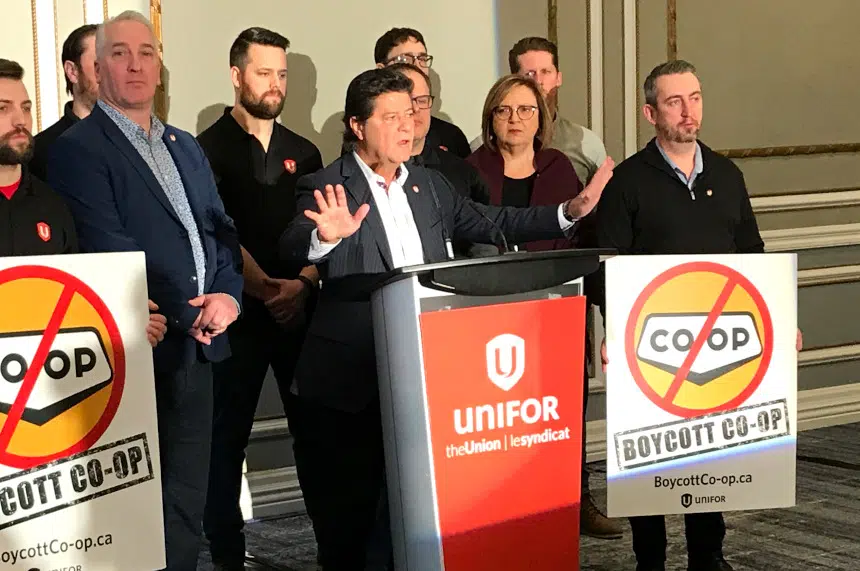An announcement Thursday morning could mean movement in the labour dispute at the Co-op refinery.
Unifor has been saying that it wouldn’t go back to the bargaining table until the refinery agreed to never touch the pensions of union members in future talks, but the refinery said that was untenable and wouldn’t agree.
However, at a room filled with Unifor supporters on Thursday morning, national union president Jerry Dias announced that requirement had been dropped.
“We communicated with (the refinery) on Tuesday night that the pre-conditions that we had put on the bargaining table we were now prepared to remove and dramatically alter,” said Dias.
Dias said the union is prepared to keep bargaining over the pensions into the future.
But Dias said the employer is now requiring that the union take down its barricades at the refinery before it will go back to the table.
The Co-op Refinery Complex (CRC) confirmed in a statement that “a discussion has taken place with Unifor regarding the resumption of bargaining.” But the company noted it won’t return to the table while Unifor maintains what the company called an “illegal” blockade.
Unifor has erected fences at the refinery after previously blockading cardlocks and stores in Regina and Weyburn.
The company’s statement said the union needs to show it will be willing to bargain in good faith.
“In light of Unifor’s escalation in the past week, and the Court of Queen’s Bench orders and the recent contempt of court ruling, CRC believes Unifor should respect the court and comply with the court order regarding access to the refinery,” the statement said.
When asked how likely it is that the union will take down the barriers, Dias made a face and the union supporters filling the room laughed. Dias said this is the refinery moving the goalposts.
“The pre-conditions were about the pensions — we can find a way to get there,” he said. “But now it keeps changing. My guess is if we were to take down the barricades and everybody went home, they would have another condition the next morning.”
Dias said the refinery just wants things back the way they were for the first five weeks of the lockout, when it had all the power. The company locked out the union members on Dec. 5.
“If you want a settlement, that’s why we’re here,” said Dias, addressing refinery management. “The pre-conditions that you talked about have been met, but there is one thing that is for sure: We are not going to surrender as a pre-condition to getting back to the bargaining table.”
Dias did say the union is prepared for a major de-escalation of the fight, but that would only happen if the refinery stopped using replacement workers.
Dias also talked about what happened on Monday night, when police moved in to break up the barrier and ended up arresting 14 people — including Dias.
He said there was violence from police officers and noted he doesn’t have any question whether that will happen again if things continue, because he believes the refinery is putting a lot of political and economic pressure on the police.
“Are we expecting another violent attack on our picketers? The answer is yes. That’s what we are trying to avoid,” said Dias.
Dias and Regina Police Chief Evan Bray met later Thursday — a meeting Bray described in a statement as being productive.
Before the meeting, Dias said he hoped the chief would contact the refinery and demand a cooling-off period, then say he’s not going to take a side in the dispute.
Though the chief has said since Monday that blockading a business is illegal in and of itself, Dias feels the police action on Monday showed the police were taking sides in the dispute.
Reacting to a $100,000 fine
When asked about the $100,000 fine levied against the union in a contempt of court ruling on Wednesday, Dias said Unifor will be challenging the order in court.
He said lawyers are investigating an appeal of the fine and injunction as well, saying there are a lot of legal issues to be followed up on.
“That’s $100,000; that’s a heck of a lot of money,” Dias said. “But you can’t put a price on justice … Is the fine significant? The answer is yes, but will that change our position to finding a settlement that is fair to our members? The answer is no.”











